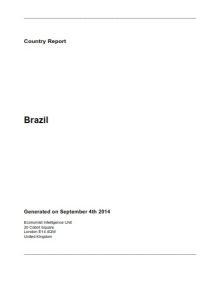Join getAbstract to access the summary!

Join getAbstract to access the summary!
Economist Intelligence Unit
Brazil
Country Report; September 2014
EIU, 2014
What's inside?
A close presidential race and a lackluster economy cloud Brazil’s prospects.
Recommendation
The Economist Intelligence Unit’s report on Brazil is a well-informed and up-to-date look at what continues to be a fluid situation in the midst of a contentious electoral campaign. Indeed, at the time of writing, incumbent president Dilma Rousseff faced probusiness candidate Aécio Neves in a run-off election in late October 2014. The report lays out a compelling narrative on the challenges ahead for the nation, regardless of who will lead it. getAbstract commends this survey to executives, portfolio managers and country analysts, all of whom will find this study equally informative and actionable.
Summary
About the Author
The Economist Intelligence Unit is an independent research and analysis organization.

































Comment on this summary